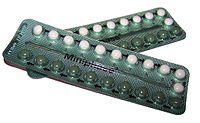
Effect of Family Planning Counseling After Delivery on Contraceptive Use at 24 Weeks Postpartum in Kinshasa, Democratic Republic of Congo
Sign Up to like & getrecommendations! Published in 2018 at "Maternal and Child Health Journal"
DOI: 10.1007/s10995-018-2667-y
Abstract: Introduction Unintended pregnancy during the postpartum period is common. The aim of this study was to describe contraceptive use among postpartum women and assess whether family planning counseling offered by health care providers during well-baby… read more here.
Keywords: contraceptive use; modern contraceptive; use; planning counseling ... See more keywords

Cell phone ownership and modern contraceptive use in Burkina Faso: implications for research and interventions using mobile technology
Sign Up to like & getrecommendations! Published in 2019 at "Contraception"
DOI: 10.1016/j.contraception.2018.11.006
Abstract: Objectives With over 420 million unique cell phone subscribers in sub-Saharan Africa, the opportunities to use personal cell phones for public health research and interventions are increasing. We assess the association between cell phone ownership… read more here.
Keywords: cell phone; modern contraceptive; contraceptive use; ownership ... See more keywords

Individual, household, and community-level predictors of modern contraceptive use among married women in Cameroon: a multilevel analysis
Sign Up to like & getrecommendations! Published in 2022 at "International Health"
DOI: 10.1093/inthealth/ihab092
Abstract: Abstract Background Unintended pregnancy remains a major public health and socio-economic problem in sub-Saharan African countries, including Cameroon. Modern contraceptive use can avert unintended pregnancy and its related problems. In Cameroon, the prevalence of modern… read more here.
Keywords: modern contraceptive; level; contraceptive use; individual household ... See more keywords

Childhood Origins, Migration, and First Modern Contraceptive Use in Turkey.
Sign Up to like & getrecommendations! Published in 2021 at "Studies in family planning"
DOI: 10.1111/sifp.12176
Abstract: This paper integrates contraception into the extant migrant-fertility framework using the case of internal migration within Turkey. Drawing from the 2013 Turkish Demographic and Health Survey data, we show that migration is positively associated with… read more here.
Keywords: modern contraceptive; turkey; contraceptive use; first modern ... See more keywords

Spatial variations and associated factors of modern contraceptive use in Ethiopia: a spatial and multilevel analysis
Sign Up to like & getrecommendations! Published in 2020 at "BMJ Open"
DOI: 10.1136/bmjopen-2020-037532
Abstract: Objective To assess spatial variations in modern contraceptive use and to identify factors associated with it among married women in Ethiopia. Design Cross-sectional analysis of population-based and health facility data. Setting Ethiopia Demographic and Health… read more here.
Keywords: contraceptive use; modern contraceptive; spatial variations; use ... See more keywords

Does family planning counselling during health service contact improve postpartum modern contraceptive uptake in Ethiopia? A nationwide cross-sectional study
Sign Up to like & getrecommendations! Published in 2022 at "BMJ Open"
DOI: 10.1136/bmjopen-2021-060308
Abstract: Objective This study examined the association between family planning counselling receipt during the 12 months preceding the survey and postpartum modern contraceptive uptake in Ethiopia. We hypothesised that receiving family planning counselling either within the… read more here.
Keywords: planning counselling; modern contraceptive; contraceptive uptake; postpartum modern ... See more keywords

Use of Modern Contraceptive Methods in Family Planning Among Married Women in Guinea
Sign Up to like & getrecommendations! Published in 2021 at "Journal of Geriatric Oncology"
DOI: 10.11648/j.jgo.20210906.11
Abstract: Introduction: The use of modern contraceptives by married women remains a challenge in Guinea despite ongoing efforts. The objective of this study was to analyse the factors associated with the use of modern methods of… read more here.
Keywords: use modern; contraceptive methods; married women; guinea ... See more keywords

The role of counseling on modern contraceptive utilization among HIV positive women: the case of Northwest Ethiopia
Sign Up to like & getrecommendations! Published in 2018 at "BMC Women's Health"
DOI: 10.1186/s12905-018-0603-3
Abstract: BackgroundOver 90% of the children with Human Immunodeficiency Virus are infected through the mother to child transmission process according to literatures. Preventing unintended pregnancy by using contraceptive methods is crucial for reducing maternal and child… read more here.
Keywords: modern contraceptive; utilization; age; contraceptive utilization ... See more keywords

Modern contraceptive use among women of reproductive age in Ghana: analysis of the 2003–2014 Ghana Demographic and Health Surveys
Sign Up to like & getrecommendations! Published in 2018 at "BMC Women's Health"
DOI: 10.1186/s12905-018-0634-9
Abstract: BackgroundContraceptives are used in family planning to space or limit pregnancies and are categorized into modern and traditional methods. The modern methods have been proven to be more scientifically effective at preventing unwanted pregnancies than… read more here.
Keywords: contraceptive use; modern contraceptive; modern contraceptives; demographic health ... See more keywords

Prevalence and factors associated with modern contraceptives utilization among female adolescents in Uganda
Sign Up to like & getrecommendations! Published in 2021 at "BMC Women's Health"
DOI: 10.1186/s12905-021-01206-7
Abstract: Background The sexual and reproductive health (SRH) needs of adolescents remain largely unmet. For instance, over 20 million female adolescents in need of, a modern contraceptive method are not using any. This study determined the… read more here.
Keywords: modern contraceptive; utilization; female adolescents; among female ... See more keywords

Socio-demographic and economic inequalities in modern contraception in 11 low- and middle-income countries: an analysis of the PMA2020 surveys
Sign Up to like & getrecommendations! Published in 2020 at "Reproductive Health"
DOI: 10.1186/s12978-020-00931-w
Abstract: Background Contraception is a key component of sustainable development, empowering women, reducing the risk of maternal and child mortality and promoting economic growth. It is part of the Sustainable Development Goals agenda, where the aim… read more here.
Keywords: modern contraceptive; low middle; modern contraception; prevalence ... See more keywords